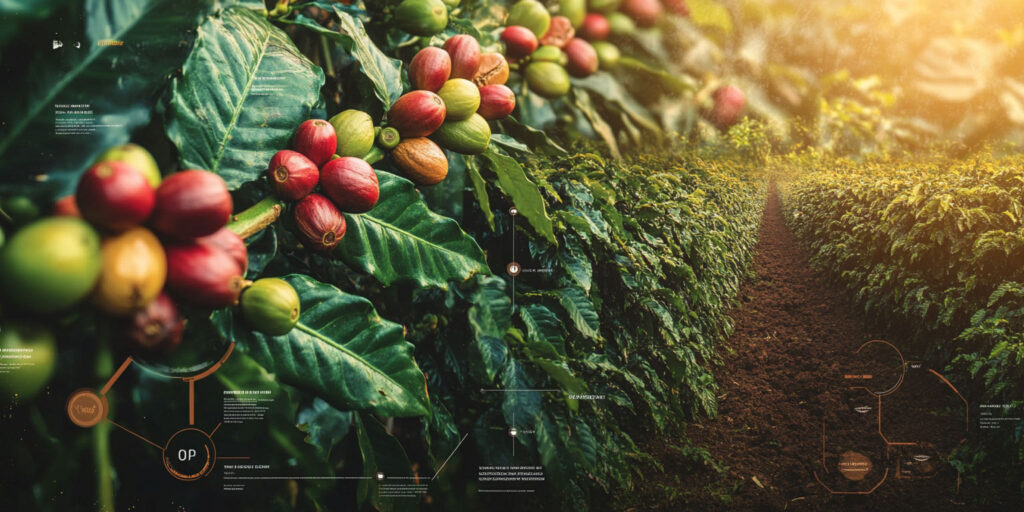
El USDA (Departamento de Agricultura de los Estados Unidos) desempeña un papel fundamental en la supervisión de la calidad y seguridad del café que ingresa al mercado estadounidense. Aunque el USDA no regula el cultivo de café en el extranjero, garantiza que el café importado cumpla con los estándares de seguridad alimentaria, previniendo la contaminación o la presencia de productos químicos nocivos. A través de diversas inspecciones y certificaciones, el USDA asegura que los granos de café que llegan a los EE. UU. sean seguros para los consumidores. Esto no solo mantiene los estándares de salud pública, sino que también respalda la integridad de la cadena de suministro del café.
Una de las áreas clave en las que el USDA influye en la industria del café es la certificación orgánica. Para que un café lleve la etiqueta “USDA Organic”, debe cumplir con estrictas pautas, como ser cultivado sin pesticidas sintéticos, organismos genéticamente modificados (OGM) o fertilizantes químicos. Esta certificación brinda confianza a los consumidores que buscan café obtenido de manera sostenible y ética. El sello orgánico del USDA se ha convertido en un símbolo de calidad reconocido a nivel mundial, ayudando a las empresas de café estadounidenses a diferenciar sus productos en un mercado competitivo.
Más allá de la certificación orgánica, el USDA también participa en iniciativas de investigación y desarrollo relacionadas con la producción de café. Al financiar investigaciones sobre control de plagas, resiliencia de cultivos y adaptación climática, el USDA apoya los esfuerzos para mejorar el cultivo de café tanto a nivel nacional como internacional. Sus esfuerzos ayudan a los agricultores a enfrentar desafíos como el cambio climático, que puede afectar el rendimiento y la calidad del café. De esta manera, el USDA no solo impacta la seguridad y calidad del café para los consumidores estadounidenses, sino que también promueve prácticas agrícolas sostenibles a nivel global.
Aquí tienes una lista de los 20 principales países exportadores de café junto con sus respectivas agencias responsables de la calidad alimentaria, incluido el café:
- Brasil – Ministerio de Agricultura, Ganadería y Abastecimiento (MAPA)
- Vietnam – Ministerio de Agricultura y Desarrollo Rural (MARD)
- Colombia – Federación Nacional de Cafeteros de Colombia (FNC)
- Indonesia – Ministerio de Agricultura
- Honduras – Instituto Hondureño del Café (IHCAFE)
- Ethiopia – Autoridad de Café y Té de Etiopía
- India – Consejo del Café de la India (Ministerio de Comercio e Industria)
- Uganda – Autoridad para el Desarrollo del Café de Uganda (UCDA)
- Mexico – Secretaría de Agricultura y Desarrollo Rural (SADER)
- Peru – Instituto Nacional de la Calidad (INACAL)
- Guatemala – Asociación Nacional del Café (ANACAFÉ)
- Nicaragua – Consejo Nacional del Café de Nicaragua (CONACAFE)
- Costa Rica – Instituto del Café de Costa Rica (ICAFE)
- Tanzania – Consejo del Café de Tanzania (TCB)
- Kenya – Dirección del Café de Kenia (Autoridad de Agricultura y Alimentación)
- El Salvador – Consejo Salvadoreño del Café (CSC)
- Rwanda – Junta Nacional para el Desarrollo de las Exportaciones Agrícolas (NAEB)
- Papua New Guinea – Corporación de la Industria del Café (CIC)
- Thailand – Departamento de Agricultura (Ministerio de Agricultura y Cooperativas)
- Burundi – Autoridad Reguladora del Sector Cafetalero de Burundi (ARFIC)

Estas agencias son responsables de garantizar la calidad de los productos agrícolas, incluido el café, en cada país respectivo, enfocándose a menudo tanto en el control de calidad como en la promoción del sector cafetalero.
